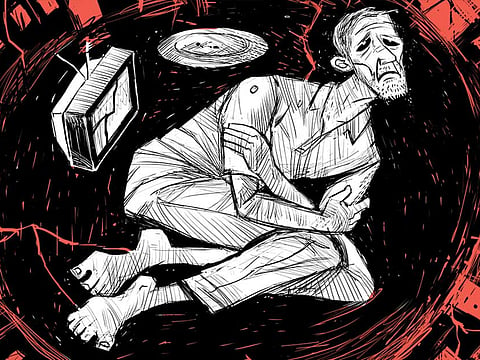No exit from a hellish world
Ain Al Hilweh, home to around 80,000 Palestinian refugees who had settled there in 1948, waiting for imminent repatriation, has been transformed from a vibrant place to one packed with desperados

You may have read that news report last Wednesday about clashes between Fatah militants and their rivals at Ain Al Hilweh, the Palestinian refugee camp outside Sidon in south Lebanon, that wounded at least four people, including a three-year-old boy who suffered a bullet wound to the head.
And then no doubt you turned the page of your newspaper, as you sat at your breakfast table, and nonchalantly moved on to reading about seemingly more important events, say, how United States President Donald Trump’s joint address to the Congress sought to introduce a “new chapter of American greatness” and how Russia and China vetoed a United Nations Security Council resolution that would have imposed sanctions on Syria for using chemical weapons against its citizens.
Equally undoubtedly you would’ve told me that minor clashes at a Palestinian refugee camp, “notorious for its lawlessness and disrepair”, as the Associated Press called the place in its news report, are not your idea of a great hook for my column this week. But bear with me.
Ain Al Hilweh is not just an ungovernable and broken-down habitat, a placeless place we could ignore with impressive ease because of its insignificance in the broad design on things. It is home to roughly 80,000 souls, where, in 1948, many Palestinian refugees had settled, rather than in camps farther up north, because it was “closest to the Palestinian border”, where they preferred to wait for their imminent repatriation — within weeks, months at the most.
They are still waiting, 69 years on.
Yes, Ain Al Hilweh is notoriously lawless and in disrepair — and sad, unspeakably sad, where people’s lives are characterised by a climate of emotional instability, extreme poverty, physical threats, sporadic fighting and limited access to safety and justice. Imagine 80,000 people living their lives in an area encompassing a mere 1.5 kilometres. Imagine the impact on the internal psychic economy of people living in the midst of such human density, where crowding like that will assuredly rob you of your privacy needs, without which human beings will be unable to maintain their sanity.
In Ain Al Hilweh abject poverty, density and social pathology are rampant.
Since the camp’s inhabitants, like other Palestinians in Lebanon, are prevented by law from seeking employment, “whether paid or unpaid”, they sell their muscle to the black market, working as day labourers on construction sites, orchards and embroidery workshops — with long work hours and smaller pay — or as cleaners, hired hands in grocery stores, bakeries and the likes. And the children? The United Nations Relief and Works Agency reports that there is a comparatively high drop-out rate among them, as students are often forced to leave school in order to support their families.
Then there’s the constant violence, triggered by the tension between rival groups in control of different parts of the camp. Last Tuesday’s clashes were not the first to take place there, nor will they be the last.
Meanwhile, they are left broken in back and spirit, not only by poverty and destitution, but the existentially terrifying realisation that they have no way around, through or out of their plight. In a situation like that, you feel stuck in place till you grow old and die. Yet, even more terrifying, is knowing that your condition is not triggering in you a fight-or-flight response. Far from it, for you know you have neither the means to fight nor a place to flee to. Instead, you let your despair take control of your senses.
Locked for eternity
It all reminds one of Jean Paul Sartre’s iconic 1944 play, Huis Clos (No Exit), a depiction of the afterlife, in which three deceased characters find themselves punished by being locked in a room together for eternity, a reference to the playwright’s existentialist idea about the struggle against having to see yourself objectified as “the other”, that is, as an object from the view of another person’s consciousness.
As a Palestinian who arrived in Ain Al Hilweh, at the age of seven, to live there with his parents (“It’s so close to the border, son”, they averred, “we’ll return back home soon from here”), Sartre’s play — which I read at college light years and many continents away from Ain Al Hilweh — spoke to me, about me and from me. Now I look at those 80,000 unfortunate souls still living there, with no exit from the hellish world they inhabit. Yes, good old Ain Al Hilweh — which means ‘Sweet Natural Spring’ — was where I acquired my original leap to a maturing consciousness.
But Ain Al Hilweh was then different, with its moral optimism about the future, its defiant street sounds, its pontificating cafe ideologues and its poetry-quoting shoemakers, where everyone knew everyone was in all this together, from the same place, a place like no other, so full of our communal sense of reference. Now it is a place packed with a passel of desperados, where they put a bullet to a three-year-old’s head without flinching. And, folks, you’ve heard, as I have, that it’s the same in all the other camps — both in exile and in the occupied homeground.
Damn the Zionist experiment and what it has done to Palestine and its native people.


